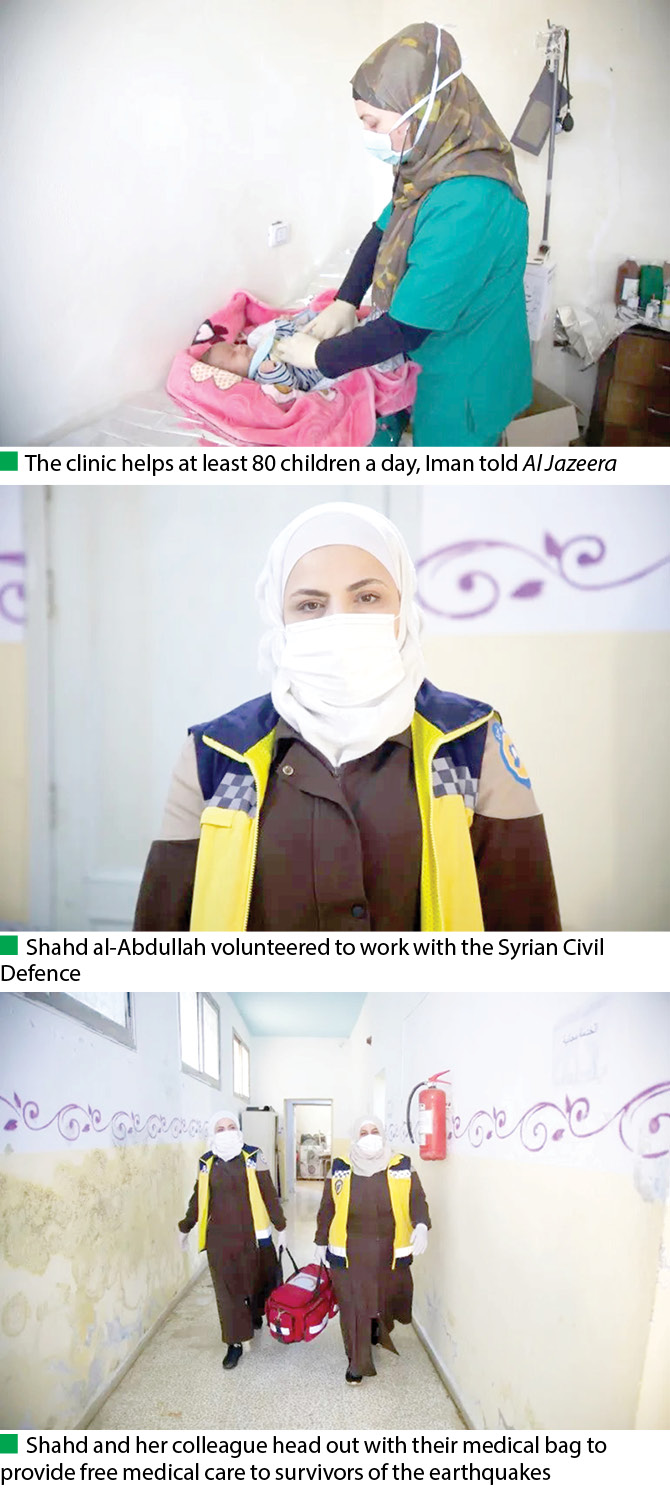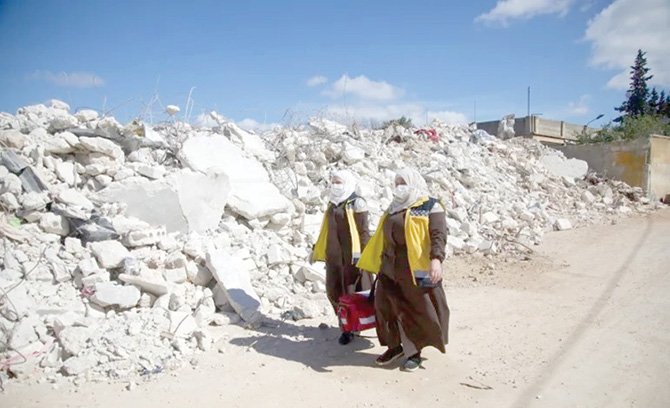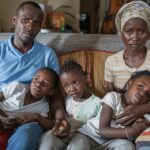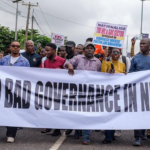Idlib, Syria – A month after devastating earthquakes struck northern Syria, Moufida Ghanem is mourning the loss of a son and the destruction of her home, which collapsed on her and her two boys, breaking her leg and killing her 18-year-old son.
Rescued from under the rubble with her 15-year-old son, Ali, the 40-year-old widow now finds herself having to cope with yet another loss. But she has been able to rise to every challenge so far.
“For the past six years, I have been the mother and father at home,” she told Al Jazeera from a tented encampment in Azmarin, Idlib province. “Now I have to be a mother, father and brother for my son.”
Nigeria must strengthen legislation to curb rising terrorism threats – Centre
ICT contributions to Nigeria’s GDP surpass oil, gas – Minister
When her recovery is complete, Ghanem said, she will look for work to try to provide a ”decent life” for what remains of her family.
A number of remarkable portraits of women’s strength are emerging from northwest Syria as it struggles to recover from the massive earthquakes.
Single or widowed women like Ghanem find themselves forced to live in overcrowded encampments where humanitarian organisations say they are at heightened risk of harassment and abuse.
The International Rescue Committee (IRC) has found that more than 60 percent of the surveyed households had a head of household defined as a person at risk, including female-headed households.
“Women and girls told us they do not feel safe going to the bathroom in overcrowded collective shelters,” Elias Abu Ata, communications offi Most available shelter options also lack essential facilities like bathrooms and toilets, which has a disproportionate effect on the safety of women and girls.
More than 8.8 million people have been affected by the quakes across Syria, according to United Nations figures, and more than 105,000 people have been displaced.
‘A sublime mission’
Last month’s devastation has made the roles women already play much more important.
About a month before the earthquake, Iman Abdel Razzaq, 44, had quit her job as a paediatric nurse to undergo vascular surgery on her foot. But when the mother of four saw the scale of destruction and the needs that came with it, she set up a medical centre to treat people free of charge, partnering with a number of her colleagues who pitched in all the medical equipment they owned.
“The situation in Jandaris was apocalyptic, people were terrified, children were crying everywhere and we could hear the moans and groans coming from under the houses that had fallen on the families living there,” Abdel Razzaq told Al Jazeera.
“I was afraid after the earthquake, but I only thought of how I could help people,” she said, adding that their clinic receives at least 80 children daily in addition to men and women who need care and some pregnant women who need emergency deliveries.
Iman and her colleagues have managed to keep the project going from the day they set it up, right after the earthquakes. “Our work is voluntary and individual as we strive to provide free healthcare to people who need it. We rely on individual donations to buy more supplies for the clinic and haven’t received support from any organisations or authorities,” she said.
Asked whether the work ever overwhelms her, she answered: “I gain my strength from working because I consider medical and humanitarian work to be a sublime mission, it is saving lives and helping people.”
‘My son asks me if the next shock will kill us’
The female health professionals in northwest Syria are very busy taking care of others, and they also have to deal with the trauma their own children went through.
“When I come home, the first thing my seven-year-old son asks me is if we will die when another shock occurs,” Shahd al-Abdullah, a 29-year-old medical services volunteer with the Syria Civil Defence, a rescue group operating in opposition-held parts of Syria also known as the White Helmets, told Al Jazeera.
The IRC survey found two in three children showed signs of psychological distress, such as increased crying, sadness and nightmares, with more than half of the households interviewed saying their children were having nightmares.
Al-Abdullah used to live in Saraqeb, east of Idlib, but moved to Qorqanya to live with her parents after being displaced by war in 2019.
Her mother had woken up when the earthquake hit, and started shouting at everyone to get out of the house, al-Abdullah recalled, so she grabbed her son in her arms and made her way out into the street, surrounded by the bewildered faces of her neighbours.
“I waited a little for the aftershocks to calm down then I left my son with my parents and headed to the Civil Defence centre. As I walked along, I was astounded at the level of destruction and the number of people out in the street in the rain and freezing wind; none of them knew what to do,” she said.
Because the scale was so huge, the Civil Defence volunteers were not confined to working in their original roles. “My specialisation is emergency care, but I was working with the search and rescue teams to find people stuck under the rubble as well as offering them emergency care at the medical centres,” al-Abdullah explained.
“One of the things that happened that I won’t be able to forget is that one day we rescued a pregnant woman from under the rubble. She was still alive when we put her in the ambulance so she could go to the hospital.
“She grabbed my hand and said: ‘Don’t leave me, I’m frightened for the baby.’ I was trying to calm her down the whole way to the hospital but sadly once we arrived we realised that she had lost the baby. In addition to that, she had extreme injuries to her bones that resulted in her paralysis,” al-Abdullah said sadly.
The Civil Defence teams have been working nonstop since the earthquakes, and among the things that Shahd and her colleagues do is to head out to the camps to offer medical care to the survivors living there. “We try to reassure these people, some of whom live in terrible conditions, that the Civil Defence is here for them and will not abandon them and that we will help as much as we can,” al-Abdullah continued.
“We have proven, as women, that we can work in the most difficult conditions and in all fields. Women now work in the Civil Defence, and in the medical and humanitarian fields, they’re making a difference everywhere, in most civil society organisations,” she said.
‘Indescribable feelings’
“When I saw the destruction that impacted so many of the people of Jinderes and Afrin, I was deeply affected and really wanted to help somehow, no matter how small my contribution would be,” 22-year-old artist Yasmine Khalil told Al Jazeera.
For her, healing the psychological wounds left by the tragedy is the most important thing.
“I only have my brushes and my colours to help people with, so I started working on paintings that showed the painful reality we were living in Jandaris,” she said. The paintings show the destroyed buildings as smoke and dust rise.
“In one of the paintings, a woman is crying and screaming as she emerges from the rubble clutching her dead son to her chest.”
Yasmine wanted to sell her paintings to raise money to help shelter or support at least one family in the stricken area. So she held a live auction online and ended up raising nearly 6,000 euros ($6,300).
“My dream had been to sell all my paintings to raise even just enough money to help one affected family. I could never have imagined that I would end up raising this much. This money that was raised could help set up tents to shelter nearly 50 families.
“My feelings are indescribable,” she said. “With my brush and colours, I managed to contribute to the relief of the afflicted.”
Source: www.aljazeera.com

 Join Daily Trust WhatsApp Community For Quick Access To News and Happenings Around You.
Join Daily Trust WhatsApp Community For Quick Access To News and Happenings Around You.


